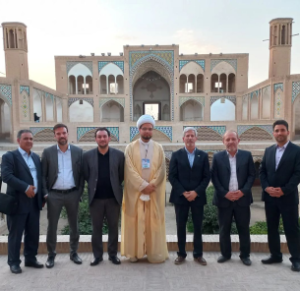By: Mana Honarpisheh
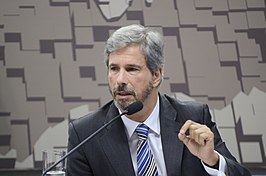 Laudemar Gonçalves de Aguiar Neto, born in 1960, has been a diplomat since 1982. In Brasília, he worked in the Trade Promotion Division, the Department of Development Policies, the Department of International Organizations, and the General Under secretariat for Multilateral Affairs. He was also National Secretary of the National Organizing Committee of the United Nations Conference on Sustainable Development (Rio+20) and International Advisor to the Mayor of Rio de Janeiro, from 2013 to 2016. Abroad, he served at Brazilian Embassies in the then Soviet Union, Spain, France (on two occasions), Uruguay, the United Kingdom, and Ghana. From November 2017 to February 2021, he was Ambassador to Suriname. He has been Ambassador to Tehran since 28 February 2021.
Laudemar Gonçalves de Aguiar Neto, born in 1960, has been a diplomat since 1982. In Brasília, he worked in the Trade Promotion Division, the Department of Development Policies, the Department of International Organizations, and the General Under secretariat for Multilateral Affairs. He was also National Secretary of the National Organizing Committee of the United Nations Conference on Sustainable Development (Rio+20) and International Advisor to the Mayor of Rio de Janeiro, from 2013 to 2016. Abroad, he served at Brazilian Embassies in the then Soviet Union, Spain, France (on two occasions), Uruguay, the United Kingdom, and Ghana. From November 2017 to February 2021, he was Ambassador to Suriname. He has been Ambassador to Tehran since 28 February 2021.
Thank you so much for giving Trends this exclusive interview despite your busy schedule, we are very grateful. On the occasion of the 200th year anniversary of Brazil’s independence from Portugal, please tell our readers about Brazil, its history, people, art, culture and economy, as well as its amazing nature and touristic attractions.
On the occasion of the 200th year anniversary of Brazil’s independence from Portugal, please tell our readers about Brazil, its history, people, art, culture and economy, as well as its amazing nature and touristic attractions.
In these 200 years of independence, we have managed to develop our economy, initially focusing on commodities such as rubber and coffee. In the 1930’s, we began to diversify and industrialize to the point where we were the 6th or 7th economy in the world by the early 2000’s, and we are currently among the top 10 large economies. We, like Iran, have wonderful diversity in terms of nature and natural resources. We host 80% of the Amazon region, while the remaining parts are contained in our neighboring countries to the north of the continent. We have wonderful beaches, but no snow, like you do in Iran. We are a country of immigration, proud of our population diversity and tolerant of all religions. We have not only the original Brazilian people, but also people from all around the world. The majority of Brazilians are Christians, but we also have Muslims, Hindus and Jewish people. Having established the Republic in 1889, we started to develop our political system. This year we are holding presidential, legislative, and gubernatorial elections.
We may either have our president reelected or have a new president. Since 1989 and re-democratization in Brazil, we have had subsequent presidents and 2 impeachments
without political turmoil. It’s of course, not simple to have a president impeached but it happened, and things went on. In 1992, the vice president took office, and again in 2016, Temer replaced Dilma Rousseff. Now there are 2 frontrunners, and people will accept whoever wins, despite some radicalizations seen not only in Brazil but all over the world, especially in democratic countries. There is more polarization in political terms, but in the end, democracy will prevail. Our institutions are strong, giving us many reasons to celebrate what we have achieved. We of course, have several problems and pressing issues to resolve. While inequality in Brazil is very high, it has decreased over the years, and our economy is growing since Covid-19. However, we have better days ahead of us regarding social economic prospects.
What is the significance of the Independence Day for Brazil and Brazilians? What were the key events and milestones that led to the independence movement in early 1800’s, which eventually resulted in the declaration of the Republic? How is it celebrated in Brazil and around the world by Brazilian expats?
Although we also celebrate the Republic Day, the Independence Day, which is our national day, is the most important occasion for historical reasons. Brazil’s Independence from Portugal is unique in that it is unlike what happened in the other countries that fought for independence, especially speaking in Latin America. In Brazil, we did not have a revolution or fights, but it was the son of the King of Portugal who refused to return to Portugal and declared independence. Interestingly enough, after he left Brazil for Portugal due to political positions, he fought his brother and became the king of Portugal. So, Peter I, Emperor of Brazil, became Peter IV, King of Portugal.
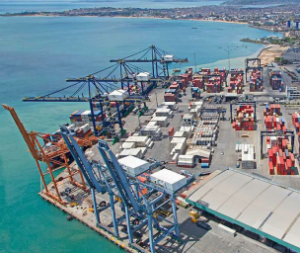 |
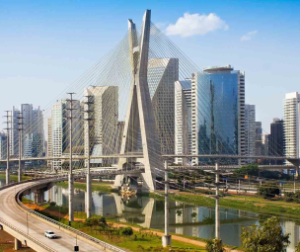 |
While there were revolutions during the imperial phase, the army and the government managed to keep the integrity of Brazil, aided by the patron of our diplomacy, Baron of Rio Branco, who was a minister at the beginning of the Republic, from 1902 to 1912. We expanded our territory by winning several territorial disputes. Brazil, therefore, is one of the few
countries in the world, that has no border issues with 10 countries. This is unique in the South American history of colonization by Spain and Portugal. On this day, there is usually a military parade with the presence of the president and other authorities. Foreign, especially Portuguese, authorities are sometimes invited to join as well to show that despite our independence, relations between Brazil and Portugal have always been respectful. This year, for instance, we have the real heart of the former Emperor Don Peter, whose wish was to have his heart in a cathedral in the city of Porto, north of Portugal. It was brought to Brazil by the Mayer of Porto and displayed for several days until September 7th. We already have the body of Peter I in the Imperial Museum, moved to Brazil for the celebration of 150 years of independence. The president of Portugal came to Brazil for the Independence Day, demonstrating the good relationship we have with Portugal. We celebrated the day in our embassies and consulates all
around the world. This year in Iran, it should have been on September 7th, but out of respect for Muslim traditions and the religious month of Safar, during which you cannot have music and happy celebrations, I decided to postpone it until the Republic Day on November 15th. We only had something very Brazilian, a barbecue for the embassy staff and members of the Brazilian community, and somethings smaller just for Brazilians. As special guests, the Ambassador of Portugal, his wife, and diplomats from the Embassy of Portugal were present in our barbecue.
When we officially celebrate our national day on November 15th, the Ambassador of Portugal will be the main guest, apart from authorities from Iran who will also be present. The way we celebrate every year, without anger and in peaceful, joyful events together with Portugal, manifests how different it is from other countries’ independence. Brazil managed to eventually turn the darkest heritage of colonialism, namely slavery, into an advantage, creating a multi-racial and inclusive society. However, we know that racial discrimination exists everywhere in world, including in Brazil. Please tell us about your thoughts on this subject and how the Brazilian government and civil institutions are fighting racism. Firstly, you are right. There is still racism in Brazil, which is rooted in slavery. Human beings were forced to leave Africa and become slaves in the Americas. We received around 40% of all slaved people in Brazil, which is an unfortunate fact we should always remember so that it is not repeated.
Portugal and Brazil: Two Nations Bound by One Language
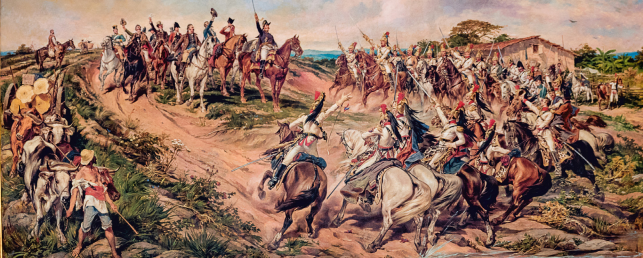
The abolition of slavery was a major factor in the fall of monarchy since our economy had been based on farms and agriproducts, which in turn depended on the slave labor force. But, even after slavery was abolished and during the republic, there were no political or official policies to integrate those who had gained their freedom and properly include them in society, educate them or grant them possibilities to have jobs or initiatives. Although 54% of the population is accounted for by African origin or mixed-race Brazilians, they are not properly represented in any part of the government. While there are very few exceptions of black people who have become generals, ambassadors, or entrepreneurs, they are mostly involved in sports, arts, and the entertainment industry, just like in the United States. In the United States, Barrack Obama was elected as the first black president, but in Brazil the number of people who have been able to achieve this status even in the Parliament is extremely limited. Women are also underrepresented in Parliament and other parts of the government.
The inequality between people of black and white origins is still a reality today, but we have attempted to mitigate the problem in the last 30 years since democratization by introducing several affirmative action policies to include people. This, let’s say, heritage needs to be addressed very firmly and urgently, and we have the will to do it. If you were to summarize the state of affairs between Iran and Brazil, in terms of political relations as well as trade activities, how would you describe it?
We have excellent relations marked by the celebration of 120 years of diplomatic ties next year. Despite government changes in both countries since signing the first agreement in 1903, we have always kept a pragmatic, respectful, and mutually advantageous relationship, which has never been undermined by ideological or political differences. Over the last 15 years, trade has increased significantly, especially after visits in Brazil between President Ahmadinejad and President Lula (Luiz Inácio Lula da Silva). Brazil and Turkey played an essential role in attempts to reach a nuclear agreement, which unfortunately did not happen until five years later. Today, we have very good trade with Iran, which is, of course, not easy due to the unfair unilateral sanctions that make it hard for Iran to trade with its partners.
As I always say, while Brazil accepts sanctions imposed by the UN, we are against unilateral sanctions against Iran, or any other country, as they only hurt people and make trade and relations more expensive, more difficult, and lengthier. There is fear of harm if countries trade with Iran, which sometimes leads to over-compliance, but in the end, people manage to do business despite the sanctions.
What is the trade volume between Iran and Brazil today? What products and services are still being exchanged, if any? do you see any major emerging trends? Are there any business delegations visiting either side any time soon? If so, in what sector(s) and when? Are there any major cultural/artistic activities between the two countries planned for 2022?
There are different numbers on the table. The official balance from the Brazilian side is lower than that from the Iranian side, but we must consider indirect trade, which is significant due to sanctions. Despite official statistics, Iran reports values above $4 billion, while figures for Brazil stand at around $2.2-2.5 billion. This does not include all our indirect trade via countries such as Turkey, Oman, and Emirates, making measurements difficult.
Trades have seen an increase in volume, maybe not as much as the value in dollars, with imports of urea from Iran and our agriproducts specially corn, soy, sugar, beef and poultry to Iran. Iran has been and will be the main destination of our agriproducts in the region, East Asia, and Middle East because bilateral trade relations are in the interest of both countries. Trade will increase sharply in terms of value because of the rise in prices of food products and finished products. Urea prices go higher and so do corn prices, especially due to the Ukraine crisis and the general rise in world prices of commodities. Over the first 8 months of this year, figures for our trade with Iran almost doubled compared to the same period last year, rising from around $1.4 billion to $3 billion, which is 95% in favor of Brazil. We are aware of the imbalance, and we should import more from Iran. Whenever I meet businessmen, I ask them to do business with Brazil, but you must do your part and make yourselves more visible.
You must be present, go to Brazil and participate in fairs and exhibitions, just like Brazilian businessmen are doing here. They were in IranPlast in February and in Iran Agrifood last year, this year, and will be present next year. More than 30 businessmen from our industry accompanied the Minister of Agriculture to Iran. If you are not present to promote your product and company, the consumer will choose a brand that they know over the Iranian one. This is also true for importers. They should know about the quality of Iranian products. In these one and a half years I have visited different cities and several companies from the food industry to mining, and I can confirm the quality of Iranian products. We can help at the embassy by creating contact between producers and buyers, but the rest is on you to go to Brazil and introduce the quality of your products. I have had talks with your very active ambassador in Brazil, Mr. Hossein Gharibi, about preparations for the celebration, deciding to include cultural events while highlighting trade, economy, and the bilateral exchange between our countries. After 6 years of negotiations, our plans have already been approved by both governments. We are still deciding if the joint economic and trade commission that is going to be held next year, probably in the second quarter, will be in Brazil or Iran, but we hope it will attract businessmen from both countries. I should also add that the revival of the JCPOA can create numerous new business opportunities and possibilities between our countries and industries. An example is when unliteral sanctions forced us to halt talks with Iran over the purchase of Embraer planes. We hope that the revival of the agreement can facilitate this, and other areas hindered by the sanctions and over-compliance.
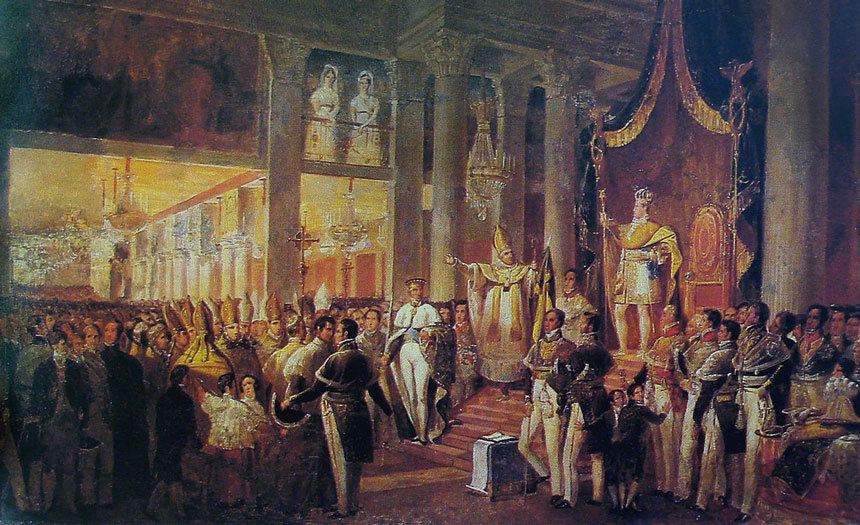
Iran and Brazil Celebrate 120 Years of Friendship
But even if they do not return to the JCPOA, we will continue to trade with Iran and try our best to increase and diversify our trade as we have done so far. As I always tell our Iranian counterparts, we have never turned our back to Iran in rough times, and authorities and businessmen acknowledge and appreciate this. Having political support and confirming that support from both governments is significant in any trade exchange. Unfortunately, there are no cultural activities and delegations now, but we hope that we will be able to make arrangements for forthcoming celebrations. We have some things in mind from classical music to visual arts and sports, but we yet have to see if we will have the financial means and the possibility to arrange those. It is worth mentioning that we have some football players here. I think the main name now is Raphael da Silva Arruda in Esteghlal, but we also have some coaches working in Esteghlal, Persepolis and Abadan. I believe that like this sport and football link between our countries, the trend will never stop. Brazil is very advanced in several sectors including agri-food, energy (including biofuel), aviation, pharmaceutical, automotive and much more. Is there a realistic chance for Iran and Brazil to cooperate in any such areas regardless of the fate of the nuclear negotiations? Will large Brazilian companies do business with Iran even if the JCPOA is not revived? I don’t see any problems in companies and businesses dealing with what they call the humanitarian areas like food and healthcare. Trade relations with Iran, including joint ventures, will continue and even expand. Regarding other sectors, it will largely depend on the relations that companies and businesses have with the US, and the penalties for breach of sanctions. As I mentioned, fear of retaliation by the US may be so intense that they wouldn’t even think of trading with Iran, as has happened in different areas in Brazil, Europe, and Asia. However, what I have seen since I arrived here is that some businesses find creative ways to dodge sanctions and increase or diversify trade.
With time, more Brazilians will see how unfair and futile those sanctions are and seeing the increasing number of countries trading with Iran, Brazilians will follow. I have seen equipment from European and Asian countries in Iran, despite the sanctions. There are, therefore, ways, and in international trade interested players will do whatever it takes to find ways to trade with Iran or any other country. What I think is important to note here is that, due to governments’ different positions, the interests of businesses from different countries do not always match. The most important thing is to further national interests, as does Brazil. As global traders, we try to defend our own national interests regardless of other countries’ positions, and we remain independent this way. Our large businesses will accordingly consider the advantages and disadvantages of trading with Iran or any other country. As I said, the volume of trade with Iran is increasing and, in some ways, diversified, and I don’t see why this trend wouldn’t continue in future What do you see as the biggest hurdles on the way of doing business between the two countries (US sanctions, lack of information among traders on both sides etc.)? What do you see as the opportunities and challenges for Iran in 2022 and beyond (economically, geopolitically, internationally…)? As I said, the million-dollar question is whether the revival of JCPOA will happen. There were moments last year, when everybody was confident, but nothing happened. This was followed by talks in March this year and again, a few weeks ago, but it still didn’t materialize. It seems to me that whenever they are close to a deal, something compromises the agreement, and there are always excuses and explanations from both sides.
BRAZIL FACTOID is our other related facts about Brazil
Trade between Iran and Brazil has almost never been and will never be balanced, but to increase exports we must import more from Iran. That is the basis of any trade relationship, and we are confident that it will be achieved and will reach other areas, such as technical cooperation, technological and scientific cooperation’s and cultural exchange. To do this, we must know each other more. Brazil and Iran know very little about each other. You are familiar with our sports, beaches, and the Amazon. The first sentence I heard here was “Abadan Brazilete”, which means “Abadan is your Brazil”. I’m going to Abadan for the World Cup to watch a Brazilian and if possible, an Iranian match. But this is the extent of Iranians knowledge of Brazil and the same is true for Brazilians. There have been documentaries focusing on Iran, but still people sometimes confuse Iran and Iraq, thinking the country is covered by deserts, and people ride on camels wearing burqas. It couldn’t be further from the truth.
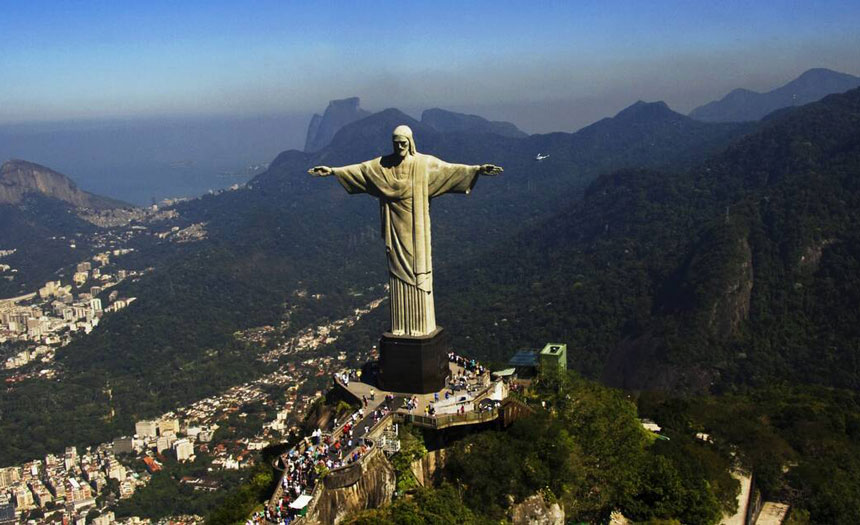
Apart from the lack of knowledge, there is also western propaganda against Iran that focuses only on politics, leaving out the realities and diversities of Iran. This calls for measures to improve bilateral tourism, which is of course complicated by sanctions. For instance, there are no direct flights between Brazil and Iran. Yet, we still have companies that run flights between Iran and Brazil via third countries. And I know that Brazil is far away, but it is not further than the US, Canada, New Zealand, and Australia, meaning the same trade and touristic relations can happen with Brazil. Regarding trade, we have had the Iran-Brazil joint Chamber of Commerce here since 2017, which started an office in Sao Paolo last November. This creates a direct link between Iranian businesses and those in Brazil. A few years ago, when President Lula was here, he distributed a booklet in Farsi on how to export to Brazil, which is a book we update from time to time in several different languages. I hope we will be able to have it updated and distributed here for the 120th year celebrations next year. The book is also accessible online now because we don’t only rely on printed books.
What you have achieved over the years despite all sanctions and limitations is stunning. Of course, like us, you have problems, and we might not agree on everything, but
diplomacy is the art of finding common ground and trying to work on what unites us and what we disagree on. We may address disagreements and have discussions and seminars on specific topics in international organizations, but on the bilateral level, we have to find what we can develop together and explore ways of increasing and diversifying our relationship, which is my main goal here.
Speaking about the JCPOA, how do you feel about the ongoing talks? In your opinion, can it make Iran a possible trade and investment destination for Brazilian companies at some point? Can we expect further improvement of relations between Iran and Brazil in the foreseeable future, given the existing challenges including the geopolitical climate, hostility with the US etc.?
Regarding the talks, I must agree with Iran on two things. Firstly, the one who withdrew from the deal was the United States, so the US has the responsibility to go back to the process. Iran waited for a year to see what would happen and how Europeans would react to the unilateral decisions made by the US. However, INSTEX failed, which made Iran respond to what the Trump administration did. Secondly, given the possibility of Trump or the republicans regaining power in the United States, it is hard to predict what will happen if republicans take control of the Senate and the House of Representatives in the mid-term elections. Given the fact that US pulled out from the agreement, even if an agreement is signed soon, what advantages will it bring Iran without a minimum guarantee of continuity in case of a change in the government? I don’t know the technicalities of the negotiations beyond what is released to the press, but I just hope for an agreement because, like in 2015, it could be beneficial for all parties and increase business opportunities.
If the main objective of the E3 and the US is to make sure that Iran has a peaceful nuclear program, and if Iran complies with it and it can be verified why not reach an agreement?
The terms of the agreement, and reactions of companies in other countries will determine how Brazilian businesses would act. I think at the beginning there will be much more trade than real investments, but Iran should be recognized as the most stable country in the region, with a population of around 85 million people, making it a huge market.


Brazil has a legendary national Football team. How do you assess the upcoming World Cup in Qatar? Any predictions for Brazil and/or Iran? Will you be attending any of the matches?
Regarding the World Cup, I think apart from 1970, when Brazil was everyone’s favorite, our team has only won when the odds were against it. For instance, in 1982 we had a dream team and expected to win and be world champions again after 12 years, but we lost to Italy. That was a mourning day in Brazil, and we all cried in streets. Then in 1994, when nobody expected it, we won in penalties. It was our revenge! In 1998, everybody thought Brazil would win but France beat us while in 2002, we won without a very good team against great teams like the Netherlands. In 2014, Brazil hosted the World Cup, giving us a good chance of winning, and you know what happened? The worst match ever against Germany, where we lost 7-1. We have a good team today, but I don’t know if we are the best, and in the World Cup anything can happen. I just hope that we can have good results and I also wish Iran success. Carlos Queiroz, a wonderful Portuguese coach, came back and I think you’ll do a great job with your good players, and if we meet at the finals, who knows? In the World Cup, anything can happen!
How has your personal experience in Iran been so far? Have you had the chance to visit other cities? Do you see any similarities between Iran and Brazil? What are some of the things that you like and dislike about Iran?
Well, I should say that I’m positively impressed with what I have seen in Iran in a little more than one and a half years. Being a diplomat in contact with the diplomatic world, I have seen a new reality of Iran, different from most western propaganda against the country. Even after researching and learning about Iran prior to coming here, I can say that it is much better than I thought. Like Brazil, you have such great natural diversity. I have traveled a bit around Iran, though not as much as I wanted to because of Covid-19, but now that I can, I am trying to visit more cities. The first city to mention is Isfahan, which I have seen six times. This week, I’m going there again, and Kashan, which is a surprise jewel on the way to Isfahan. I’ve been to Arak, Chalus, the Caspian Sea, Bandar Abbas, Qeshm, Hormoz Island, Shiraz and Persepolis (twice), and Yazd. I also went to Qom just last week to meet Brazilian students who are studying Islam there. I’m planning to visit Mashhad in October and Abadan in November, and I also have Tabriz and Hamedan on my schedule. So, the idea is to travel and learn about the country as much as I can, not just as a tourist. My trips to Isfahan have mostly been as a tourist because every guest that I have, and I have had at least one guest every month since April, wants to go to Isfahan, and with good reason. Naqshe Jahan is the most beautiful square in the world, together with the Red Square. I’ve also been astonished in shiraz, Yazd, and other places that I’ve been to. I don’t like skiing, but I would love to go up to Tochal ski station just to have my chocolate, as I have before, and then come back to catch a plane and go to Qeshm or Kish and bathe in the Persian Gulf, all on the same day. Although I have done it before on different days, they say in Iran all that is possible in one day, and that is what I am planning to do. I probably cannot break the former Austrian Ambassador, Stefan’s record of 23 provinces in Iran, but I hope I can manage at least half of that. He is now the Ambassador to Brazil and has already visited at least 10 states there. He is a machine! From the four months we spent together, I should say that he is a very good friend and human being.
|
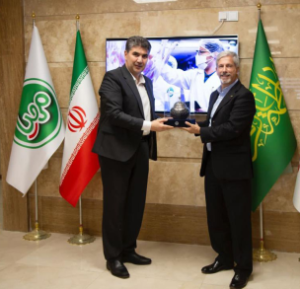 |
H.E. Ambassador Laudemar Goncalves de Aguiar Neto Visits Kashan, Brazilian Ambassador to Iran, the head of the Brazilian Meat Exporters Association
and the head of the Iran-Brazil Chamber of Commerce visit Protein City
Isfahan Province
But what impresses me most about Iran is the Iranian people. They are very welcoming and they like foreigners very much, which is another similarity to Brazil as Brazilian people are also kind and open to foreigners. I’ve been interacting with the diplomatic community here, which is of the highest quality from all over the world, and what they all like most about Iran is the Iranians.
While I have a very good Farsi teacher, I’m a lousy student, so no blame on her, but I hope that in a year I can build a few more Farsi sentences. However, despite my broken Farsi and the fact that I can only say Salam, Sobh bekheir, Khaste nabashid, people are happy to see you trying. From authorities, to businessmen, to artists and people in the streets, I am impressed by the way they treat me as a Brazilian. I never tell people that I’m an ambassador when I meet them. If I’m asked about my job, I first say that I work at the Brazilian Embassy and then if they ask more questions, I have to say that I’m the Ambassador. Usually, when you visit a country, the first and second
questions that people ask are about your name and your profession. In Iran, it is your name and next whether you like Iran. They always want to know if you like Iran and if you are feeling well and happy here. When you say yes, they get delighted and want to know why. I think the one thing that people from all around the world agree on is that Iran deserves respect.
That is something in their soul, regardless of their ideology, political stance, where they come from and where they go. They feel that Iran is not being respected although it is what they need and long for. When you tell them that you like and respect Iran because of Iran itself and Iranians, people rejoice because they want people to know the different realities of Iran.
When visiting country, you don’t care who the president, the king or the ruler is. You want to learn about the people, places, history, and natural diversity. I think the more open Iran is to foreigners and tourists, the more people will come
to Iran and realize how great this country is.


